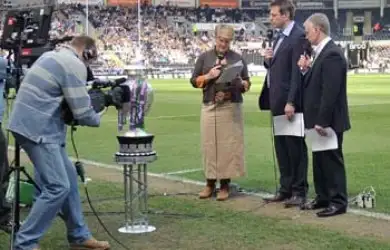Media’s love-in with union continues as BBC sticks the boot in

Super League clubs are in debt. I’m sure I wasn’t the only one surprised by this groundbreaking revelation that’s set to be exposed by a BBC documentary tonight.
With four teams having gone in to administration in Super League in the past two years, who would have guessed?
The investigation concludes that too many teams are generating “insufficient turnover” and “too much cumulative debt”, having looked at the balance sheets of 11 of the 14 Super League clubs.
Welcome to sport.
There are very few sports clubs in the UK free of debt – two of the biggest clubs in the world, let alone the UK, in Manchester United and Liverpool football club’s have been saddled with debts in recent history.
Clubs in other sports regularly miss payments, re-form and enter administration, yet appear to have missed the wrath of a BBC documentary to date.
But of course, the Six Nations starts on Saturday. The jewel in the BBC’s dwindling crown of sport (I still haven’t seen the other half of the 2012 Formula 1 season).
So what better time to “bag” rugby league? Ahead of the new Super League season, and as a nice reminder to the Great British public that union is king.
At a time where rugby league needs all the help it can get, the RFL is forced to defend itself to one of its supposed major partners, just days before the start of the new season.
The RFL’s Blake Solly said: “Rugby League’s health compares favourably to every other major sport. Attendances were at an all-time high in 2012, more people saw the game on television than ever before and the RFL was able to make record levels of financial disbursements to clubs.”
Owing to the lack of revenue opportunities in sport, unless you are a player or in football, this writer covered Sale Sharks against Scarlets in rugby union’s LV Cup on Saturday. Sale, as it happens, are in a relegation dogfight with financial issues of their own (perhaps it’s something in the water at the Salford City Stadium).
Last year, another union side Wasps were close to administration, reporting losses of more than £2m per year and requiring up to £8m just to stay in existence. A report from that time states “the majority of the Premiership clubs are still making a loss and relying on the contributions of financial benefactors to stay afloat.”
Again, welcome to sport.
The only slight consolation is that, like most rugby league shows by the BBC, it’s only being shown in Yorkshire, Lincolnshire and the north west (how many professional rugby union teams are there north of Birmingham again?).
But this isn’t about having a dig at rugby union, a successful sport on and off the field in its own right. The point is, why has rugby league been targeted, when such an investigation could have incorporated several sports and struggling clubs?
All we’re asking for is a fair crack of the whip. Read Nigel Wiskar’s recent defence of the sport following an outburst from The Times’ rugby (sic) correspondent Stephen Jones.
Rugby league beats itself up enough, without having to field blows from outside the ring.
With the RFL, very publicly, currently on the lookout for sponsors, it’s an ideal time for the BBC to air the results of its investigation.
Bring on Friday, when the madness starts all over again.